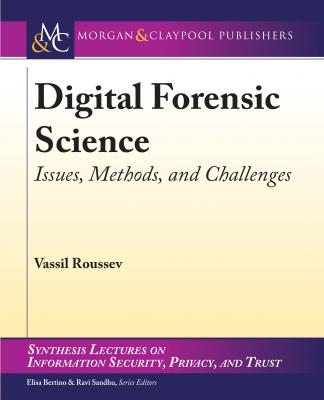Digital Forensic Science. Vassil Roussev
Читать онлайн.| Название | Digital Forensic Science |
|---|---|
| Автор произведения | Vassil Roussev |
| Жанр | Компьютеры: прочее |
| Серия | Synthesis Lectures on Information Security, Privacy, and Trust |
| Издательство | Компьютеры: прочее |
| Год выпуска | 0 |
| isbn | 9781681732015 |
Digital Forensic Science
Issues, Methods, and Challenges
Synthesis Lectures on Information Security, Privacy, & Trust
Editor
Elisa Bertino, Purdue University
Ravi Sandhu, University of Texas, San Antonio
The Synthesis Lectures Series on Information Security, Privacy, and Trust publishes 50- to 100-page publications on topics pertaining to all aspects of the theory and practice of Information Security, Privacy, and Trust. The scope largely follows the purview of premier computer security research journals such as ACM Transactions on Information and System Security, IEEE Transactions on Dependable and Secure Computing and Journal of Cryptology, and premier research conferences, such as ACM CCS, ACM SACMAT, ACM AsiaCCS, ACM CODASPY, IEEE Security and Privacy, IEEE Computer Security Foundations, ACSAC, ESORICS, Crypto, EuroCrypt and AsiaCrypt. In addition to the research topics typically covered in such journals and conferences, the series also solicits lectures on legal, policy, social, business, and economic issues addressed to a technical audience of scientists and engineers. Lectures on significant industry developments by leading practitioners are also solicited.
Digital Forensic Science: Issues, Methods, and Challenges
Vassil Roussev
2016
Differential Privacy: From Theory to Practice
Ninghui Li, Min Lyu, Dong Su, and Weining Yang
2016
Privacy Risk Analysis
Sourya Joyee De and Daniel Le Métayer
2016
Introduction to Secure Outsourcing Computation
Xiaofeng Chen
2016
Database Anonymization: Privacy Models, Data Utility, and Microaggregation-based Inter-model Connections
Josep Domingo-Ferrer, David Sánchez, and Jordi Soria-Comas
2016
Automated Software Diversity
Per Larsen, Stefan Brunthaler, Lucas Davi, Ahmad-Reza Sadeghi, and Michael Franz
2015
Trust in Social Media
Jiliang Tang and Huan Liu
2015
Physically Unclonable Functions (PUFs): Applications, Models, and Future Directions
Christian Wachsmann and Ahmad-Reza Sadeghi
2014
Usable Security: History, Themes, and Challenges
Simson Garfinkel and Heather Richter Lipford
2014
Reversible Digital Watermarking: Theory and Practices
Ruchira Naskar and Rajat Subhra Chakraborty
2014
Mobile Platform Security
N. Asokan, Lucas Davi, Alexandra Dmitrienko, Stephan Heuser, Kari Kostiainen, Elena Reshetova, and Ahmad-Reza Sadeghi
2013
Security and Trust in Online Social Networks
Barbara Carminati, Elena Ferrari, and Marco Viviani
2013
RFID Security and Privacy
Yingjiu Li, Robert H. Deng, and Elisa Bertino
2013
Hardware Malware
Christian Krieg, Adrian Dabrowski, Heidelinde Hobel, Katharina Krombholz, and Edgar Weippl
2013
Private Information Retrieval
Xun Yi, Russell Paulet, and Elisa Bertino
2013
Privacy for Location-based Services
Gabriel Ghinita
2013
Enhancing Information Security and Privacy by Combining Biometrics with Cryptography
Sanjay G. Kanade, Dijana Petrovska-Delacrétaz, and Bernadette Dorizzi
2012
Analysis Techniques for Information Security
Anupam Datta, Somesh Jha, Ninghui Li, David Melski, and Thomas Reps
2010
Operating System Security
Trent Jaeger
2008
Copyright © 2017 by Morgan & Claypool
All rights reserved. No part of this publication may be reproduced, stored in a retrieval system, or transmitted in any form or by any means—electronic, mechanical, photocopy, recording, or any other except for brief quotations in printed reviews, without the prior permission of the publisher.
Digital Forensic Science: Issues, Methods, and Challenges
Vassil Roussev
www.morganclaypool.com
ISBN: 9781627059596 paperback
ISBN: 9781627054652 ebook
DOI 10.2200/S00738ED1V01Y201610SPT019
A Publication in the Morgan & Claypool Publishers series
SYNTHESIS LECTURES ON INFORMATION SECURITY, PRIVACY, & TRUST
Lecture #19
Series Editors: Elisa Bertino, Purdue University
Ravi Sandhu, University of Texas, San Antonio
Series ISSN
Print 1945-9742 Electronic 1945-9750
Digital Forensic Science
Issues, Methods, and Challenges
Vassil Roussev
University of New Orleans
SYNTHESIS LECTURES ON INFORMATION SECURITY, PRIVACY, & TRUST #19
ABSTRACT
Digital forensic science, or digital forensics, is the application of scientific tools and methods to identify, collect, and analyze digital (data) artifacts in support of legal proceedings. From a more technical perspective, it is the process of reconstructing the relevant sequence of events that have led to the currently observable state of a target IT system or (digital) artifacts.
Over the last three decades, the importance of digital evidence has grown in lockstep with the fast societal adoption of information technology, which has resulted in the continuous accumulation of data at an exponential rate. Simultaneously, there has been a rapid growth in network connectivity and the complexity of IT systems, leading to more complex behavior that needs to be investigated.
The goal of this book is to provide a systematic technical overview of digital forensic techniques, primarily from the point of view of computer science. This allows us to put the field in the broader perspective of a host of related areas and gain better insight into the computational challenges facing forensics, as well as draw inspiration for addressing them. This is needed as some of the challenges faced by digital forensics, such as cloud computing, require qualitatively different
